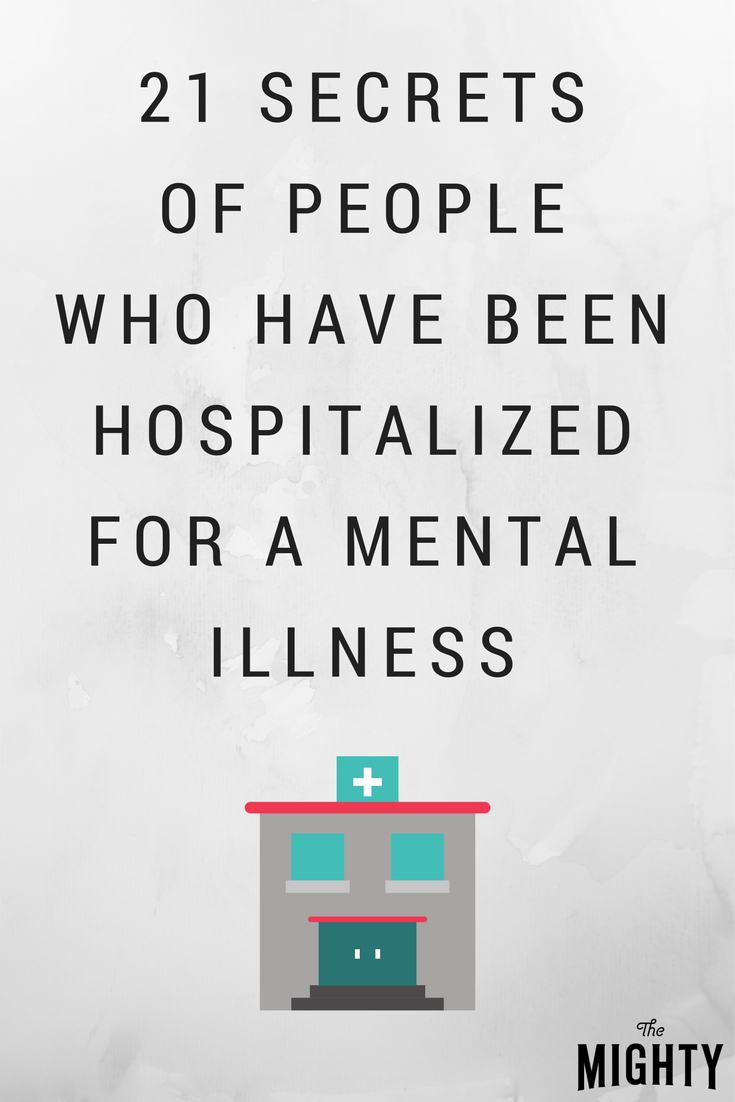21 Secrets of People Who Have Been Hospitalized for a Mental Illness
It is unfortunate that for many people, hearing the words “mental hospital” can conjure up images of straight jackets and lobotomies — maybe something akin to what you’d see in a horror film. But what some might not realize is that many psychiatric hospitals are a place where people can receive the “round the clock” care they need when they are experiencing a mental health struggle. Just like treatment for a physical illness, psychiatric hospitalization can help patients get back on their feet.
Each person who has been hospitalized for a struggle with mental illness has a different story. And while not everyone has had a positive experience with hospitalization, it is important to remember that no matter what you’ve been told or how you’ve been treated, you are never “too far gone” or unworthy of getting the support you need.
We wanted to know what people who have been hospitalized for a mental illness want others to know, so we asked members of our mental health community to share one thing they wished others knew about their experience.
Here’s what they shared with us:
1. “I’m not ‘crazy.’ Being hospitalized is totally different than what they show in the movies. It’s not people screaming and straight jackets. It’s people walking in their pajamas with blankets wrapped around them going to group and talking or watching movies. The hospital is a safe place where it’s OK to not be OK, where it’s OK to talk about your feelings. The people in the hospital, staff and patients helped save my life so many times, I can’t count!” — Stephanie L.
2. “When I was hospitalized I was treated like a criminal. They handcuffed me and took me in a police car. This was after an overdose and I was released from the ICU. I [have] bipolar, social anxiety and PTSD. I lost my brother only a year before this happened to suicide. I want people to know that [mental illness is] just like any other illness, we are not criminals [and] we need medical help just like anyone else. We want to feel like it’s OK to get the help we need, but when we are in that situation, how does it make us feel OK to get help?” — Amanda P.
3. “I’m still human. My ER puts most of the psych patients out in the halls. The nurses give us looks and talk openly about us, making jokes about us. They keep the rooms open for the ‘medical’ patients. Even when I overdosed, I was in a room for maybe an hour, then transferred to the hallway, even still hooked up to all the machines and monitors. And if you’ve been to the same ER for for psych reasons more than once, you’re not even taken seriously. I had one staff who was evaluating me say she didn’t believe I was suicidal and sent me home. You can guess what I tried to do that night. We just want to be taken seriously and treated like human beings.” — Shelby H.
4. “Reintegration is not easy once released. I cannot just go back to cooking, cleaning, socializing and all other activities I used to do before going in. When I came out I was apprehensive of what my next moves or thoughts were going to be. I didn’t know if I trusted myself yet or others around me. I didn’t have a clear connection to how the world viewed me or how I should view the world… I wish people understood that while I was still alive and out of treatment, I needed to relearn how to live.” — Yencris B.
5. ”I wish people would understand that being hospitalized for a mental illness is no less important than being hospitalized for a physical one. Being hospitalized means you are not feeling your best no matter which part of you is sick. Whether it’s your brain or your leg, [you] should still receive the same compassion and consideration you would give any other person in the hospital.” — Robyn L.
6. “It’s not a choice. I can’t turn it off like a radio. It’s not a joke. It doesn’t mean I’m a ‘wimp.’” — Heidi D.
7. “[I wish others understood] the importance of having visitors. It takes guts to visit someone in a psych unit, but there are few more worthwhile things you will ever do.” — Lucy D.
8. “I wish people understood that a hospitalization is acute and meant for rapid, basic stabilization. The hardest thing is the expectation that if you’re admitted for suicidal thoughts you’ll be discharged a week later perfectly happy.” — Rebecca P.
9. “It is not personal if I don’t want visitors. When I tell you not to visit me, it isn’t because I don’t love or care about you or appreciate your support. There are issues I need to work through, I know you are there, but sometimes I don’t want you to see me like that, or have you potentially make triggering comments. I may just need some time to get myself together. It’s not because I don’t love you.” — Madison K.
10. “I am a human being and deserve to be treated with the dignity and respect anyone should have.” — Stephen H.
11. “Getting hospitalized saved my life. It offered me a place to admit to feeling awful, it discharged me from all the mundane tasks I had become incapable of doing and kept me fed and clean. Those four walls with a tiny garden kept me shielded from an environment that made me hurt endlessly. The psychiatric hospital is a place where I met other people just as broken as me, where no one judged the other patients for crying without apparent reason or wanting to stay in bed all day. It was a place where we were allowed to hurt immensely, no matter the reason and to be cared for in accordance.” — Tiny L.
12. “Just because I have major depressive disorder and social anxiety and have been hospitalized several times does not mean I’m unsafe to be around. It also does not mean I’m unworthy of being loved.” — Lisa M.
13. “I wish hospital staff were more compassionate and cared more about their job and the patients. I wish they were more educated about mental illnesses of all kinds and how to properly care for patients with those mental illnesses.” — Erin H.
14. “It’s not my fault. I’m not in control of my behavior. I’m seriously ill. I’m lonely, frightened and lost.” — Kristy O.
15. “It’s not a vacation. It’s not fun or an escape from all life’s problems. It’s like a jail that protects me from hurting myself. It allowed me to stay alive but despite my appearance, I was barely hanging on. Without being hospitalized, without a doubt I would not be here today. Being hospitalized doesn’t make things better, it helps you learn how to cope.” — Kathleen M.
16. “When I’m hospitalized, the loneliness is unbelievably unbearable. It’s physically painful. Visit me. Bring me a pack of smokes. A coloring book. A bag of magazines from the thrift store. A chocolate bar. Hug me, tell me you care. We don’t have to talk, just hang out. Just be with me. Acknowledge me, hug me, love me.” —Spaqem N.
17. “When I am released from the hospital, it doesn’t mean I am back to 100 percent. It seems my loved ones have always had the expectation that things will be all neat and tidy and squared away. The suicidality is no longer there, but oftentimes everything else is. I want loved ones to understand the recovery process is lengthy. I read an article that equated recovering from a mental health episode to an athlete recovering from a marathon. I would ask for patience and understanding and to believe I’m trying so hard to get well.” — Aurie B.
18. “I wish people understood the things that led up to my psychotic break and subsequent three and a half week hospitalization were not things I would do if I wasn’t ill. I wish people didn’t take things personally or judge me.” — Carrie P.
19. “Every time I get hospitalized, it feels like people look down on me like I’m not a fit mother. Just because I struggle with mental illnesses does not mean I can’t be a good mother too. I’m strong enough to know when I need more help and go to the hospital so my children have a mother while growing up.” — Dara M.
20. “No matter what job you do, what background you come from, who you know or where you were educated, mental illness can affect everyone!” — Dinah M.
21. “I’m not ‘crazy,’ I’m Alyssa. That’s what I want others to understand.” — Alyssa H.
Thinkstock photo via KOHb.


